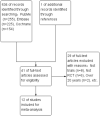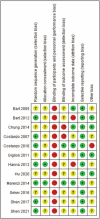Ultrafiltration for patients with acute decompensated heart failure: A systematic review and meta-analysis
- PMID: 34918656
- PMCID: PMC8677900
- DOI: 10.1097/MD.0000000000028029
Ultrafiltration for patients with acute decompensated heart failure: A systematic review and meta-analysis
Abstract
Background: Ultrafiltration plays an indispensable role in relieving congestion and fluid retention in patients with acute decompensated heart failure (ADHF) in recent years. So far, there is no consistent agreement about whether early ultrafiltration (UF) is a first-line treatment for patients with ADHF. We, therefore, conducted a meta-analysis to assess the efficacy and safety of UF.
Methods: PubMed, Embase, and Cochrane Library databases were searched for randomized controlled trials (RCTs) that compared UF with diuretics in patients with ADHF and included our interested outcomes. The primary outcomes are heart failure rehospitalization, all-cause rehospitalization, and mortality. The second outcomes are fluid loss, weight loss, and adverse events. RevMan Version 5.4.1 was used to analyze the data of included studies.
Results: A total of 12 studies with 1197 patients were included. Our results showed a reduction in heart failure rehospitalization (risk ratio [RR] 0.67, 95% confidence interval [CI]: 0.52-0.87, P = .003) and all-cause rehospitalization (RR 0.62, 95% CI: 0.42-0.92; P = .02), an increase in fluid loss (1.47 L, 95% CI: 0.95-1.99 L, P < .001) and weight loss (1.65 kg, 95% CI: 0.90-2.41 kg; P < .001). There was no difference in mortality (RR 1.09, 95% CI: 0.78-1.51; P = .62). There were inconsistent agreements about which group have more total adverse events. Subgroup analysis showed that UF with larger mean fluid-remove rate (≥200 mL/h) could significantly remove more fluid, lose more weight, and decrease heart failure rehospitalization. Less weight loss for patients with ADHF may correlated to higher percent of ischemic etiology (ischemic etiology ≥50%).
Conclusion: Although UF is more effective in removing fluid than diuretics and decrease rehospitalization of heart failure and all causes, there is not enough evidence to prove that UF is superior because of adverse events and mortality in the UF group. The mean fluid-removal rates should be set to ≥200 mL/h. Patient with different etiology may have different effects when treated with UF and it is a weak conclusion.Trial registration: The systematic review was registered with the International Prospective Registry of Systematic Reviews. (https://www.crd.york.ac.uk/prospero/, registration number CRD42021245049).
Copyright © 2021 the Author(s). Published by Wolters Kluwer Health, Inc.
Conflict of interest statement
The authors have no conflicts of interest to disclose.
Figures









References
-
- Rahman R, Paz P, Elmassry M, et al. Diuretic resistance in heart failure. Cardiol Rev 2021;29:73–81. - PubMed
-
- Greenberg A. Diuretic complications. Am J Med Sci 2000;319:10–24. - PubMed
-
- Marenzi G, Morpurgo M, Agostoni P. Continuous ultrafiltration in acute decompensated heart failure: current issues and future directions. Am J Cardiovasc Drugs 2015;15:103–12. - PubMed
-
- Yancy CW, Jessup M, Bozkurt B, et al. 2013 ACCF/AHA guideline for the management of heart failure: a report of the American College of Cardiology Foundation/American Heart Association Task Force on Practice Guidelines. J Am Coll Cardiol 2013;62:e147–239. - PubMed
Publication types
MeSH terms
Substances
LinkOut - more resources
Full Text Sources
Medical

